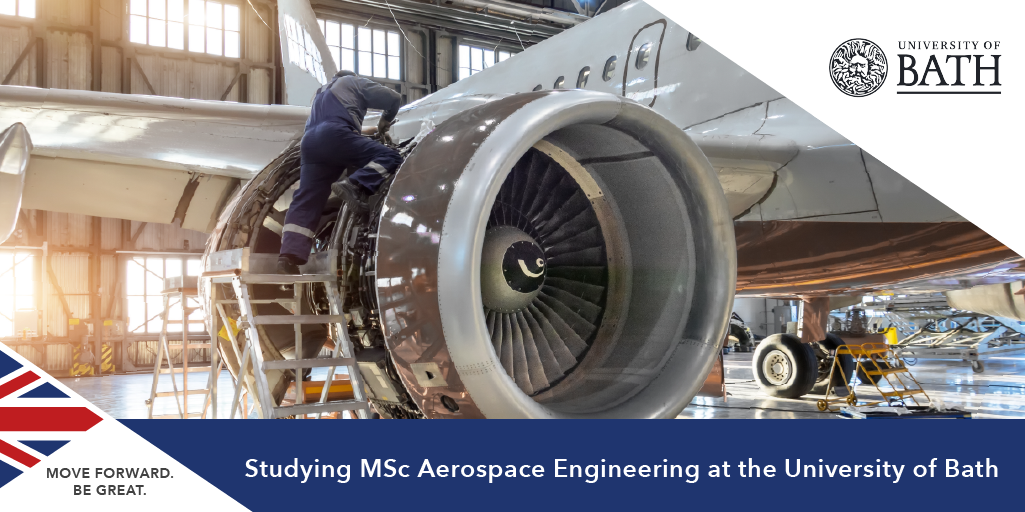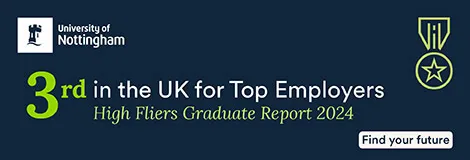Aerospace engineering can be divided into two paths: aeronautical engineering (flying within the Earth's atmosphere) and astronautical engineering (space travel). Aerospace engineers are the brilliant minds behind these aircraft's building, design and maintenance, and there are few better places to gain a thorough education in aerospace engineering than the University of Bath.
The MEng (Hons) Aerospace Engineering programme at the University of Bath takes you on a thrilling journey into this exciting field. Learn more below and begin your application by arranging a free consultation today.

Why Study MEng Aerospace Engineering at the University of Bath?
1. Leading course of its kind
On Bath's aerospace engineering master's, you'll first build a solid foundation in mechanical engineering and learn what it takes to be a pro engineer. Then, you'll dive into the nitty-gritty of aerospace, getting to grips with aerodynamics, stability, propulsion, structures, and performance. You won't just sit in a classroom either; you'll work with real aerospace experts and even take flight test courses at a local airfield.
But it's not just about technical skills. At Bath, you'll develop problem-solving skills, critical thinking abilities, a strong sense of professional ethics, and environmental responsibility. You'll work on group projects, designing new aircraft or entering competitions, and in your final year, you'll choose specialist topics for your research project – whether that's simulation, experimentation, or design.
2. Ranking
The University of Bath's aerospace engineering programme boasts impressive rankings. According to the Guardian University Guide 2023, Bath is ranked 3rd in the UK, reaffirming its excellence in the field. In the broader realm of engineering, the university maintains a strong presence, securing the 15th spot in the UK as per the QS World University Rankings. Bath's commitment to academic quality is further underscored by its 7th-place ranking in the Guardian University Guide 2024, solidifying its reputation as a leading institution for students pursuing a range of disciplines.
3. In-depth course structure and modules
At the University of Bath, the courses are structured into units of study. These units fall into two categories: compulsory and optional. Compulsory units cover the fundamental concepts essential for your degree. Some courses also offer optional units that let you specialise in areas pique your interest. As an undergraduate student, you'll typically take 60 credits (ECTS) each academic year, split into two semesters of 30 credits each. This amounts to approximately 1200 hours of study, combining time spent with instructors and your independent learning.
Here's a glimpse of the key units for the MEng (Hons) Aerospace Engineering programme:
Year 1
- Design, materials, and manufacturing
- Engineering mathematics
- Mechatronics
- Responsible engineering practice
- Solid mechanics 1
- Thermofluids 1
Year 2
- Control and mechatronics
- Design, materials, and manufacturing 2
- Engineering computation
- Solid mechanics 2
- Thermofluids 2
Year 3
- Aerodynamics
- Aerospace structures
- Aircraft performance and design
- Aircraft propulsion
- Aircraft stability and control
- Group design and business project
Year 4
- Aerospace sciences
- MEng individual project
- Project scoping and research methods
- Rotorcraft dynamics
Additionally, the aerospace engineering programme at the University of Bath is led by a team of accomplished academics who specialise in mechanical engineering. These faculty members have forged strong ties with the industry and possess extensive knowledge across diverse domains, including design, manufacturing, biomechanics, materials, automotive, and aerospace. These educators contribute significantly to the undergraduate teaching experience by leveraging their international collaborations and ongoing research endeavours.
4. Facilities
Students pursuing the MEng (Hons) Aerospace Engineering course at Bath enjoy access to leading facilities designed to enhance their learning experience. These include a design activity centre and an undergraduate model shop, which provide hands-on spaces resembling real industrial workplaces. This setup allows students to gain practical insights into working in a professional engineering environment.
Additionally, students can utilise advanced research facilities equipped with cutting-edge technology. These facilities mirror the equipment commonly used in the aerospace industry, offering a glimpse into the tools and techniques they will encounter in their future careers.
Some of the standout facilities available to students include a subsonic wind tunnel, a water tunnel, a carbon fibre manufacturing facility, and a metal 3D printer. These resources empower students to engage in practical activities and project work, fostering a well-rounded education that prepares them for success in the aerospace engineering field.
5. Scholarships
At the University of Bath, there are several opportunities for financial support through scholarships and bursaries:
- The Bath Bursary: This bursary can provide you with up to £3,000 for each year of your undergraduate studies. It's a valuable financial boost that can help ease the cost of your education.
- Gold Scholarship programme: The Gold Scholarship programme is an exceptional opportunity, offering a bursary of £5,000 per year of your studies. In addition to financial support, it includes an enrichment programme designed to enhance your personal development.
- Accommodation Bursary: If you're a Home UK undergraduate student living in University-owned accommodation during your first year of study, you may be eligible for the Accommodation Bursary. This can help alleviate some of the costs associated with living on campus.
- Placement Bursary: During your unpaid placement year, the University offers a Placement Bursary that can provide you with financial support of up to £2,000. This can be especially helpful as you gain practical experience in your field of study.
6. Great career prospects
Graduates from the University of Bath's aerospace engineering programme are in high demand among employers. Bath’s graduates have landed jobs at prestigious international companies such as Jaguar Land Rover, Rolls Royce, Airbus, nPower, Google, and Zimmer Biomet. This demonstrates the programme's ability to prepare students for successful careers in various industries at home and abroad.
7. Salary
In the United Kingdom, the average salary for aerospace engineers stands at an appealing £38,626. This figure reflects the competitive compensation professionals in this field can expect to earn. Aerospace engineers are vital in designing and developing aircraft, spacecraft, and related technologies, making their expertise highly valuable to aviation, defence, and space exploration industries.
Course Facts
- Entry requirements
You must meet certain requirements to get into the aerospace engineering programme. Here they are in simple terms:
A Levels (High School Qualifications)
- You should aim for A*AA in your A-levels.
- Specifically, you must get AAA in three A-levels, including Mathematics and Physics. If you're doing Further Mathematics, an A in that subject also works.
- International Baccalaureate (IB):
International Baccalaureate
- For IB, you should target 36 points overall
- Within those 36 points, you should have 7, 6, 6 in three Higher Level subjects, and two of these subjects should be Physics and Mathematics.
GCSE (High School) Requirements
You should have at least a grade 4 or C in GCSE English Language or Literature.
English Language Proficiency
- If English is not your native language, you must prove your English skills.
- You can do this by scoring at least 6.5 overall on the IELTS test, with no less than 6.0 in each part.
- Alternatively, if you take the Pearson Test of English Academic (PTE Academic), you should score at least 62, with no less than 59 in any section.
- Tuition Fees
The course costs £26,200 per year, and since it's a four-year programme, you'll need to plan for this amount for each of the four years. It's important to remember that there may be a yearly fee increase, but this increase won't be more than 5% each year. The exact fee for the next academic year will be announced in December, so you can check the university's fee page to see the updated amount. This way, you can budget accordingly and be prepared for any potential changes in the cost of your education as you progress through the programme.
Study at Bath
If you want to apply to study aerospace engineering at the University of Bath, contact SI-UK for a free consultation.
FAQ
What is the acceptance rate for the University of Bath aerospace engineering programme?
The specific acceptance rate for the University of Bath's aerospace engineering programme can vary yearly. Generally, it's a competitive programme, and the university considers various factors, including academic qualifications and personal statements, when admitting students.
What A levels do you need for aerospace engineering?
A-level qualifications are typically required to study aerospace engineering at the University of Bath. The specific A-level subjects required may vary, but commonly, you'll need A-levels in Mathematics and Physics, and sometimes Further Mathematics can be advantageous. These subjects provide a strong foundation for the technical aspects of aerospace engineering.
How long does it take to become an aerospace engineer in the UK?
To become an aerospace engineer in the UK, you typically need to complete a bachelor's degree in aerospace engineering, which usually takes three to four years. After that, gaining practical experience in the field can take additional time, typically through entry-level positions or internships. Becoming a fully experienced aerospace engineer may take several years of work and learning.
What is the best subject to study at the University of Bath?
If your passion and career goals align with engineering, and more specifically aerospace engineering, then pursuing a degree in aerospace engineering is an excellent choice. The University of Bath offers a reputable aerospace engineering programme that can provide you with the knowledge and skills needed for a successful career in the aerospace industry.



 I sincerely thank SI-UK for getting me accepted to UCL. The MSc in Urban Development and Planning is extremely competitive, but the right guidance provided by SI-UK made my dream of studying at University College London a reality. The services were exceptional from beginning to end.
I sincerely thank SI-UK for getting me accepted to UCL. The MSc in Urban Development and Planning is extremely competitive, but the right guidance provided by SI-UK made my dream of studying at University College London a reality. The services were exceptional from beginning to end. 

